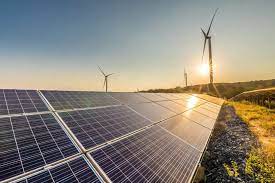The Key Role of Renewable Energy in the Transition to a Sustainable World

Source: (http://regenpower.com)
The Key Role of Renewable Energy in the Transition to a Sustainable World
By Muhammad Farhan
Energy is a basic human need that is used to carry out various daily activities and supports various sectors of life such as agriculture, education, health and economy. However, the still high dependence on non-renewable energy, such as fossil energy, has caused negative impacts such as pollution, environmental damage and increased greenhouse gas emissions. Therefore, the importance of developing and utilizing renewable energy is increasingly emphasized. Renewable energy, which is available sustainably and abundantly in nature, is a solution because it is not only environmentally friendly by not producing pollution and carbon emissions, but also provides energy independence to the community.
Global energy demand has increased significantly since 1950, reaching around 10,000 million tonnes per year, with the majority coming from non-renewable materials such as coal, gas, petroleum and nuclear energy. Among these sources, petroleum is the most critical resource due to its dwindling availability and adverse environmental impacts. Therefore, it is important to seek and utilize environmentally friendly renewable energy sources as a more sustainable alternative.
New renewable energy (EBT) in various industrial sectors in Indonesia is believed to be useful for accelerating the realization of a green economy. One of the strategic steps that can be taken is the development of green industrial areas that are supported by renewable energy sources such as rooftop solar power plants (PLTS), so that the products produced are included in the green product category. Apart from reducing the use of fossil energy, the use of EBT also has the potential to create new jobs, in accordance with the principles of a green economy which suppresses economic growth without damaging the environment.
Some potential and abundant renewable energy sources in Indonesia include solar energy, water energy, wind energy, geothermal energy and bioenergy which can be seen below.
1. Solar Energy
Solar energy is a renewable energy source originating from sunlight which plays a key role in the cycle of life on Earth including photosynthesis and wind formation. Photovoltaic solar panel technology enables the direct conversion of sunlight into electrical energy through the absorption of sunlight and the transformation of electrons into electrical energy.
2. Water Energy
Water energy is an abundant source of renewable energy in the world, where rivers can be used to produce electrical energy through a hydroelectric power plant (PLTA) system which uses the kinetic energy of water flow to spin a turbine or wheel that drives a generator to produce electricity. Hydroelectric technology can be applied on a small or large scale depending on the potential availability of existing water energy.
3. Wind Energy
Wind energy which is air that moves due to the rotation of the earth and differences in air pressure, is a source of abundant and potential renewable energy on earth. Since ancient times, the wind has been used for irrigation by turning the waterwheel which is used to drive the pump. Through a wind power generation system (PLTB), wind energy can be converted into electrical energy by rotating a turbine or windmill which drives a generator to produce electricity.
4. Geothermal Energy
Geothermal energy is heat energy stored in the earth, often found in areas crossed by the Pacific ring of fire, such as Indonesia, Japan and the United States. The use of geothermal energy has been around since ancient times for various purposes such as heating and cooking. In a geothermal power plant (PLTP) system, the working principle is similar to a steam power plant (PLTU) where hot steam from within the earth is separated from water and used to spin a turbine which drives a generator to produce electricity.
5. Bio Energy
Bioenergy is a renewable energy source from organic materials that store energy from the sun in the form of chemical energy. Bioenergy has been known since ancient times, especially with the use of firewood. Currently, the variety of bioenergy sources is increasingly diverse including crops, grass, animal waste, household waste, and agricultural waste which can be converted into liquid fuels such as biodiesel and bioavtur.
The conclusion we can draw is that energy is a basic human need that supports various sectors of life, but high dependence on non-renewable energy has caused negative impacts on the environment. Therefore, the importance of developing and utilizing renewable energy is increasingly emphasized as an environmentally friendly solution and providing energy independence to the community. In Indonesia, renewable energy sources that have the potential to be abundant include solar energy, water energy, wind energy, geothermal energy and bioenergy. By utilizing this renewable energy source, it is hoped that it can support the acceleration of the realization of a sustainable green economy and create new jobs for the community.
Source:
- https://mediaindonesia.com/humaniora/437936/pelaku-industri-dan-bisnis-harus-manfaatkan-energi-baru-terbarukan
- https://www.kompas.com/sains/read/2022/06/15/201359923/potensi-sumber-energi-terbarukan-di-indonesia?page=all#page2
- https://internasional.kompas.com/read/2021/10/06/072921170/energi-terbarukan-pengertian-contoh-manfaat-dan-kekurangannya?page=all#page2

